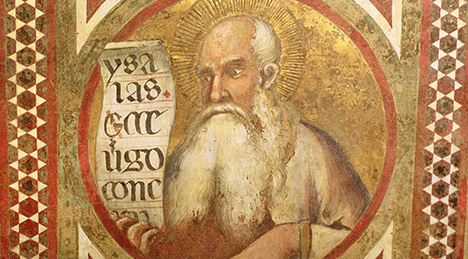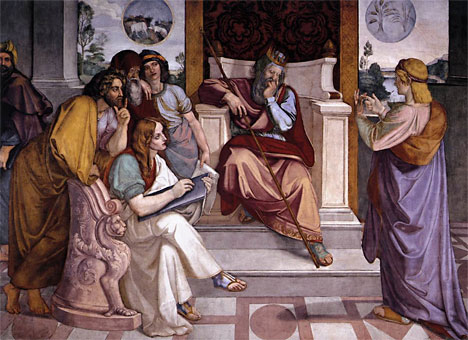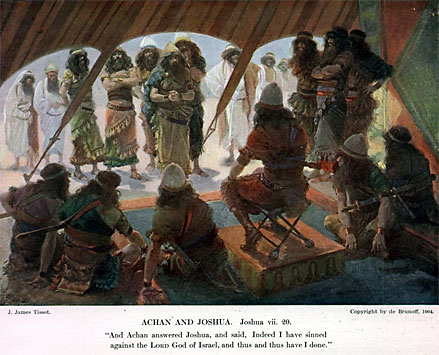Nov
29
2014

The Death of Deutero- and Trito-Isaiah
The heart of typology is representation, and representation is the heart of sacrifice.
A great deal of so-called theology seems to me to be a waste of time, breath and ink. Theologians and commentators insist on applying a “lens” to Scripture, or building a case from cherry-picked particulars or accumulations of fragmented data, when the answer to the debated question is staring right back at them. Literary structure should be the first recourse, not the last. When it comes to the Bible, literary structure is the label on the tin.
Continue reading
Comments Off | tags: Brueggemann, David A. Dorsey, Isaiah, Literary Structure, oikoumene, Peter Leithart, Systematic typology | posted in Bible Matrix, Biblical Theology, Quotes, The Restoration Era
Dec
13
2010

“Deny that God speaks to any area of life, and you have denied God’s jurisdiction in that area of life.”
A very intelligent Christian recently posed the question, “What will be the most pressing intellectual challenge facing the church over the next 50 years?” What if the biggest challenge facing the church is not intellectual at all, but ethical. [1]
Continue reading
1 comment | tags: Barth, Brueggemann, C. S. Lewis, Gary North, Genesis, Joseph, Postmillennialism, Socialism, Toby Sumpter, Van Til | posted in Ethics, Quotes
Apr
15
2009
 There is an interesting article by Walter Brueggemann here. I particularly like his reference to idols as the ‘gods of scarcity.’
There is an interesting article by Walter Brueggemann here. I particularly like his reference to idols as the ‘gods of scarcity.’
However I think he misunderstands the account of Achan’s sin, or misconstrues it support his argument:1
Continue reading
Comments Off | tags: Achan, Brueggemann, Holy war, Joshua | posted in Biblical Theology, Ethics
Apr
10
2009
Is Genesis 1 history or myth?
“The expositor [of the creation narratives] must move knowingly between two temptations. On the one hand, there is the temptation to treat this material as historical, as a report of what happened…. On the other hand, there is the temptation to treat these materials as myth, as statements which announce what has always been and will always be true of the world…. Our exposition will insist that these texts be taken neither as history nor as myth. Rather, we insist that the text is a proclamation of God’s decisive dealing with his creation.
The word “creation” is controlling for such a view. The whole cluster of words—creator/ creation/ create/ creature—are confessional words freighted with peculiar meaning. Terms such as “cosmos” and “nature” should never be carelessly used as equivalents, for these words do not touch the theocentric, covenantal relational affirmation being made…. The text, then, is a proclamation of covenanting as the shape of reality…. This theological affirmation permits every scientific view that is genuinely scientific and not a theological claim in disguise.”
—Walter Brueggemann, Genesis (Interpretation Commentary), pp. 16-17.
I agree that the Creation narrative sets the foundation for the structure of later Covenants, and also of the construction of the Tabernacle and Temple, but the explanation above is just a fancy dance to avoid the unavoidable bullet that is Genesis 1. So it’s a proclamation that affirms theological truth but not historical truth? No wonder the western church is in a pickle!
When faced with an issue in which you wish to fence-sit, REDEFINE the terminology:
“In the last analysis, the Old Testament doctrine of creation expresses a sense of the present situation of man. He is hedged in by the incomprehensible power of Almighty God. The real purpose of the creation story is to inculcate what God is doing all the time…. Thus the doctrine of creation expresses man’s sense of utter dependence on God.”
—Rudolf Bultmann, Primitive Christianity in Its Contemporary Setting, p. 18.
If Genesis 1 is not history, and it is not myth, it is ideology. Which makes this plain old boring gnosticism. These smart guys just don’t get it, do they?
As one of my old Bible teachers used to say, “If someone’s taking an odd position, there’s a bee in his pocket.”
Comments Off | tags: Brueggemann, Genesis, Gnosticism, Hermeneutics | posted in Apologetics, Creation, Quotes




























